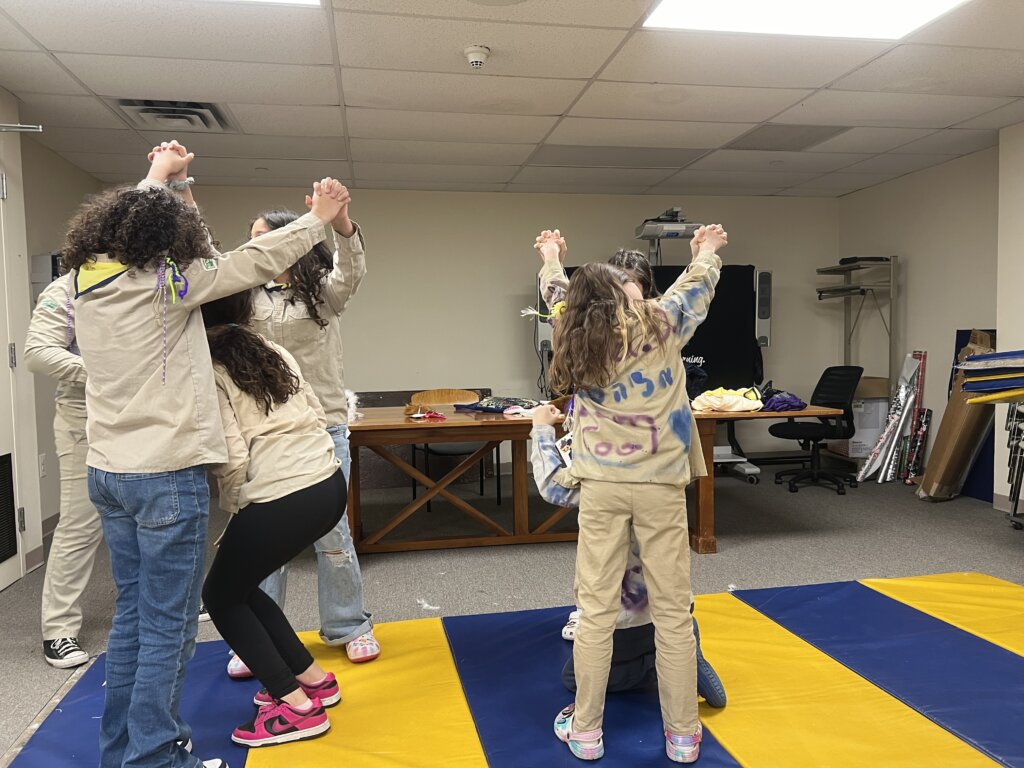Camping, crafts and Zionism: How an Israeli-American scouting program has changed since Oct. 7
In 26 chapters across the U.S., Israeli and Israeli-American scouts say they have a place to be themselves

Graphic by Angelie Zaslavsky
An Israeli-American likes to take his 12-year-old son out to eat after his weekly scouting meeting on Long Island, New York.
But because his son belongs not to a Boy Scout troop but a chapter of the Tzofim — a North American program modeled on Israel’s coed scouting network — the father now reminds him not to wear his scouting shirt into the restaurant, or to at least turn it inside out. It’s got an Israeli flag sewn above the breast pocket, and since Oct. 7 — when Hamas attacked Israel, setting off a war in Gaza — the family hasn’t felt safe wearing Israeli symbols — or even Jewish ones.
“It’s just like going out and having a target on you,” said the father, who spoke on condition of anonymity for fear of reprisals. And for the first time, he said, the family won’t be displaying a menorah in the window of their Suffolk County home this coming Hanukkah.
“Unfortunately for Israelis and for Jewish people here,” he said, “living a normal life is not possible.”
But despite his and other Tzofim parents’ fears, reflected in the the group’s increased security — an armed guard now accompanies all scouts on field trips — he will keep both his son and daughter in the program.
Israeli and Israeli-American families living in the U.S. are feeling isolated as they watch millions of people across the globe protest Israel’s offensive to remove Hamas from power in Gaza, which has killed more than 13,000 Palestinians there, according to the Hamas-controlled health ministry.
But within Tzofim, families find others who also acutely feel the pain of Hamas’ surprise attack, in which the terror group massacred 1,200 people and took another 240 hostage. Most of the 100 scouts in the chapter are the American-born children of at least one Israeli-born parent.

“Everyone knows someone who was either hurt or has, you know, someone in the army or someone who’s kidnapped,” said the Israeli-American mother of a 9-year-old scout in the Long Island chapter, which meets at the Sid Jacobson JCC in East Hills.
“In our community, a boy who had been in the Tzofim — and his brother was in my daughter’s class actually — is a hostage.”
She was referring to Omer Neutra, 21, an Israeli-American from Plainview, Long Island, who was serving as a tank commander in Gaza when he was captured. Hamas has not released him or any Israeli soldiers.
Parents also said the program also provides a refuge from antisemitism, which had been rising in the U.S. and in much of the world well before the current war in the Mideast.
“This group has been a huge support,” said the mother. “The parents don’t have to be here. They could just drop off their children and leave.”
‘A safe haven’
The Long Island chapter is one of 26 U.S. chapters of Tzofim, which is modeled and named after the scouting movement in Israel. Founded in 1995 as Friends of Israel Scouts, it serves 4,300 young people in the U.S., ages 6-18. The scouts do many of the activities that other kids do in scouting — camping trips, crafts and holiday celebrations. But many are designed to foster connections to Israel, such as creating artwork to mark Yitzhak Rabin Memorial Day. And though Tzofim does not teach Hebrew, it incorporates the language into its gatherings.
Yaniv Biran, director of Tzofim of North America, said a scout meeting may be the only time the scouts, who face antisemitism and anti-Zionism elsewhere, can relax.
“Most of our kids don’t go to Jewish schools but rather to public schools and most of their surrounding communities are not Jewish,” he said. “Once a week when they get together, it is like a safe haven for them.”
Tzofim collaborates with the Jewish Agency for Israel, which sends 26 Israelis to the United States to serve as head of each Tzofim chapter and to coordinate with the JCCs and synagogues in which the Tzofim meet.
Chapters, or “shevit” in Hebrew, are mostly located in larger metropolitan areas across the country, and enroll between 50 and 60 scouts. The largest, in New Jersey, has 600 members. The New York area has several chapters, including the one on Long Island, where children and teens meet each Sunday afternoon, sorted into eight groups according to age and grade. Tenth through 12th graders serve as counselors for younger children, and plan their own activities.
Between five and 10 children have joined the chapter since Oct. 7, including a family newly arrived from Israel, said Smadar Chen, co-head of the chapter.
Lately, the scouts have been talking about the war. On a recent Sunday, before the fifth graders began gymnastics, their 11th-grade counselor began a brief discussion of current events in Israel.
“What’s going on there now?” he asked the group.
“Israel and Hamas are trying to work out a cease-fire,” replied a fifth-grader.
“What do you think will happen?” the group leader asked.
“Israel will win,” said the fifth-grader.
Taking precautions
Since Oct. 7 the Tzofim have beefed up security. “Ensuring safety is our number one priority,” Biran said.
The Tzofim are now spending more time inside their JCCs and synagogues, he said, and planning fewer field trips and camping trips. The group is now working with the Secure Community Network, the largest Jewish security organization in the U.S., which has been connecting chapters to local law enforcement and security officials within the network of Jewish federations.
“We used to have security at events but they were not always armed,” Biran said. “Now, it is a necessity that they be armed.”
Parents pick up these additional security costs. Biran said a weekend event can come to $50, $100 or more per child.
Some field trip destinations have balked at the armed guards. “So we either not go,” Biran said, “or try to convince them that we really need those guards; otherwise we can’t come.”
He assumes the security will stay in place after the war ends and that fears will persist, but said the Tzofim will too, because the scouts have a right to their heritage.
“We are not going to stop doing what we are doing because it’s scary,” he said, “and we are going to expand our reach.”
















